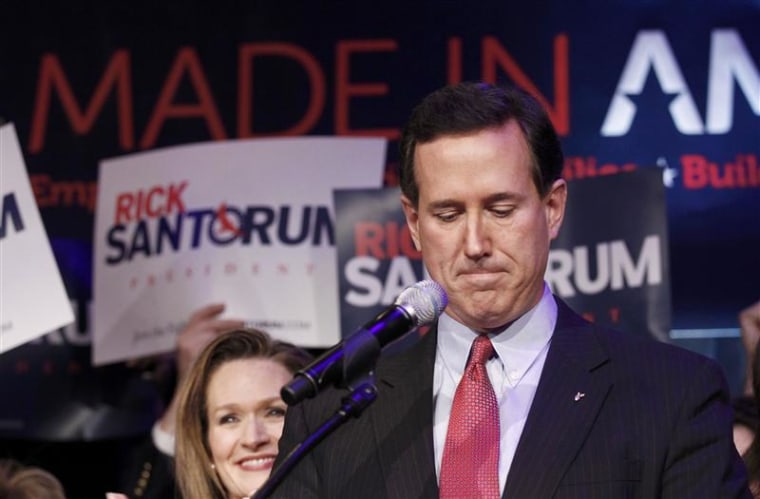Voters in Tuesday’s Michigan Republican primary were looking for a candidate who they thought could beat Barack Obama in November and they found him in Mitt Romney. The former Massachusetts governor won 61 percent voters who said the candidate quality that mattered most was the ability to defeat Obama.
Overall, 52 percent of Michigan voters said Romney was the Republican candidate most likely to defeat Obama in November; only 26 percent thought former Pennsylvania senator Rick Santorum was most likely to beat Obama.
An overwhelming majority of voters in Michigan — 54 percent — said the economy was the issue that most mattered in deciding how they voted, and 45 percent of them voted for Romney, compared to 29 percent who voted for Santorum.
Although Santorum has a long record of opposition to abortion, that issue was the deciding one for only 14 percent of voters. Nearly four out of five anti-abortion voters backed Santorum.
Thirty-one percent of Tuesday’s voters in Michigan said someone in their household had lost their job or been laid off in the past three years: 42 percent of these voters favored Romney compared to 35 percent for Santorum.
These exit poll numbers may change slightly later Tuesday evening as more data becomes available.
Rick Santorum falls short in the Michigan and Arizona primaries but says his stances on the deficit, energy production and health care make him the best candidate to challenge Barack Obama.
Despite the fact that Michigan is home to the traditional Big Three automakers, 51 percent of Tuesday’s voters said they disapproved of the federal government’s 2009 bailout of General Motors and Chrysler. And among that group, Romney and Santorum were essentially tied.
Santorum had drawn some pundit criticism in the few days by accusing Obama of being snobbish because the president, in Santorum’s words, “wants everybody in America to go to college.” Santorum’s remark was interpreted as an attempt to appeal to non-college educated Michiganders.
Those without a college degree accounted for nearly half of the Michigan electorate Tuesday, and they slightly preferred Santorum to Romney.
Santorum also did better among voters who said they had an annual family income of $50,000 or less, winning 40 percent to Romney’s 35 percent.
As he has in other states, Romney ran well among more affluent voters, winning nearly half of those earning more than $100,000 a year.
The electorate in Tuesday’s primary had relatively few people from labor union households: only 23 percent came from union households and those voters favored Santorum 45 percent to 27 percent for Romney.
Romney had accused Santorum of trying to "kidnap" the GOP primary by making robo-calls appealing to Democrats to vote for him, but Santorum's attempt appeared to fall short of success.
Only 9 percent of voters said they were Democrats and Santorum had the most appeal to them, winning 53 percent of self-identified Democrats. Romney and Rep. Ron Paul of Texas, who did not actively compete in Michigan, each won 17 percent of them.
Conservative voters were split with 43 percent saying they’d voted for Romney, 40 percent for Santorum, and 8 percent for Paul.
There was a slight gender gap in Tuesday’s electorate with 42 percent of women favoring Romney while 37 percent said they backed Santorum. As he had in previous contests Romney did very well among voters age 65 and over, winning 48 percent of Santorum’s 31 percent.
Santorum ran strongly among self-identified born-again Christians who accounted for 42 percent of the electorate in Michigan, winning half of them. But Romney, a Mormon, edged Santorum, a Catholic, among Catholic voters, getting 43 percent to Santorum’s 37 percent.
